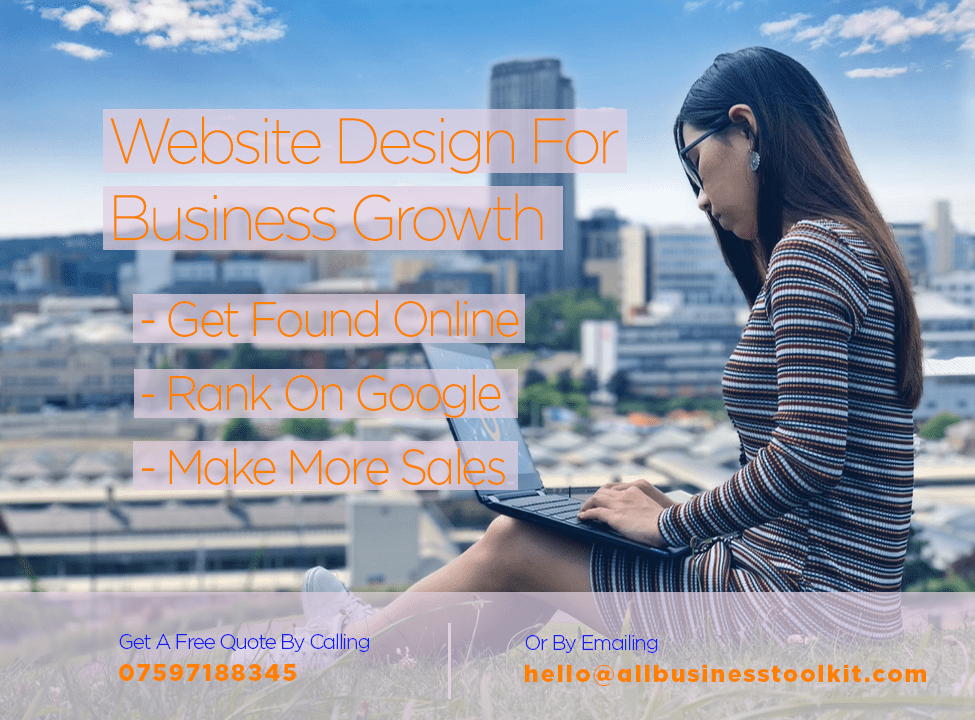In today’s world people go on the internet for information. According to (Forbes) 91% of people go online just to shop. If you have a business and you are not online then you are missing out.
Why Does My Business Need A Website? A website is crucial for your business as it opens more channels for people to find information about your business and your products. Overall, a website acts like a brochure and allow clients to contact you.
A small business faces many challenges on a day-in-day-out basis, which tests its ability to remain viable. Retaining talent in the workforce, ensuring a solid work process, delivering quality end products/service are all example of how businesses fail in the first two years. However, another prime example of where companies are falling behind today is their lack of a good website and website knowledge. According to (Researchbrefings), there are 2 million SME’s here in the UK. Shockingly, 2 millions of these lack basic digital skills. It is also noted that majority of failed business are more likely to succeed if they have digital skills. Below, I will take you through the main reasons why having a website will benefit your business. But, more importantly what you can be doing to help your business grow
1. Having A Presence Online
In today’s modern world, the Internet plays an irreplaceable role that greatly affects our daily lives. According to a Landmark report, the average person spends more than a day a week on the internet. Furthermore, since 2019 nearly 60% of the world population now has access to the Internet.
More shockingly, according to Approval Index, 2 million SMEs don’t have a website, costing them more than £343 billion each year. However, having a website can help uplift your revenue by £174,000 per business.
Why should this matter for your business?
If your business has no presence online, then potential consumers will not see you. Furthermore, they may assume that your business is not legitimate. However, the main concern is that you are missing a whole stream of revenue and customer insights.
In this article, I will discuss the importance of building a website for your business and go over these points in more detail.
2. Extending The Reach Of Your Business
Everyone is talking about SEO (search engine optimisation). This term has been a hot topic for the last 20 years because SEO means free potential customer walking through your door. More literally, it is getting your business found in a search engine like Google.
Many small businesses that are successful gain a local popularity. However, there is a process of sales people and grafting to find potential clients. A website can help customers find you from across the world, whereby the cost is nothing.
Having a presence on the Internet guarantees that people can see your business from across the globe. Using your website, customers can access to your catalogue and make purchases a thousand miles away.
The potential reach is limitless.
However, you may be thinking that your customers are not online… Or, that the nature of your product/services are not relevant for making sales online. This is a common misconception, as according to Clutch.co, two-thirds of small businesses use their website to connect with customers, which leads directly to sales.
Maybe, you hold a local service such as a horse riding instructor or a local garage. But, your expertise can always be translated to making sales online (if you think outside of the box).
However, more importantly without a website you are missing potential sales from different corners of the world.
3. Website is Cheaper Than Paid Advertising
Traditionally, getting customers through the door or on the phone was through paid advertising methods. The general rule of thumb would be that a business re-invests 5% of its profit back adverts. This would be into channel like printed media, radio, television etc…
This costs money start-ups do not have. Having a website will make promoting your company less expensive. Many versions of offline advertising available on the internet are free (such as social media and SEO), and it’s a great place to start when your first setting your business up.
4. Provides A Professional Appeal To Customers
A website means more than a platform for business. It is also a testament of professionalism.
According to (Bussiness2Community) 94% of visitors judge your business based on the design of your website, and do not purchase because of bad design.
This means by having a well-designed website you will steer people to your business as you present yourself as being professional.
A website creates a professional appeal to potential customers. This is greatly advantageous because it breaks down the barrier of first impressions. By having a website that clearly represents the positive aspects of your business builds a professional appeal to potential customers and get them to like you before you have even spoke to them.
Unfortunately, if you do not have a website in this modern can create the opposite effect. For example, by not having a website can look bad on your business and your overall reputation.
5. Scale Your Business
Have you ever experienced having to
turn customers away because it is closing time? Well, you do not have to close
the doors of your website. You can visit a website anytime of the day or
night.
Having a website will be more convenient for your customers and leads.
This is because you get to a website through a mobile phone making it easy for
your customers to purchase from you.
Many will be more likely to visit your website, rather than driving a car to your physical location and browsing for your products. In addition, People like to browse and be being spontaneous. If you catch them, in their good mood (maybe after a drink in the evening), they may purchase from you and you did not even have to do anything! Just make sure to post enough information about your products and services.
6. Track public interest in your products and services
Did you know that if you own a website, you can actually track everything that is happening on it?
You can even look for information that will tell you how many people visited your site, or how many people messaged or emailed you. You can access the progress of your website and view all its pages.
7. Cuts Overhead Costs
Websites and online businesses are cheaper to run and maintain than a high a street shop. A high street shop can cost you anywhere from £500 – £1500 a month. This is more money that most start-ups will be making until the second year of running.
A website is much less than, for example, our basic service is only £35 a month. This is much less and you have access to a far bigger audience.
Not only will it reduce the risk for new businesses, you are able to new ideas without a big upfront investment.
8. Credibility
Following off from the previous point, after gaining that sense of professionalism leads to credibility. Having set up your business website you now have an image and reputation to protect online.
People in your industry will be looking to hear what you have to say. By which you can use your website to provide background into the products, services and knowledge that you have. By which you provide useful and valuable information that will trigger people to follow you, read your blogs, which will in turn position your business as the go to place for that product/service.
By having a website, you are able to reach out to people and give them the opportunity to trust you. As all sales people will know, building trust is the biggest factors for securing the deal. Most people will search the internet for a product or service before the purchase to check the credibility first. When you provide good service or product, positive word-of-mouth about your business is likely to spread.
A great way a building trust online is having a testimonial page and sharing this with your followers on social media. If your get in the habit of sharing a few stories a month then more people will surly jump on the bandwagon. Overall, gaining a business brand which results in gained trust and building further connections for business growth.
9. Accessible Around the Clock
A physical store closes and opens at designated intervals.
For this reason, if the customers visit past the closing hour, you are obliged to turn them away, close the door and lose sales after closing hours.
This was not an issue before your competitors entered the internet.
Especially, e-commerce.
A website makes your business accessible around the clock, 24 hours a day and seven days a week.
If your customer is surfing online for something you could offer them, late at night they may make the purchase then, rather, than waiting until the next day when you are open.
This means a customer will want your service or product they can either order on the fly or message you at any given time convenient for them.
Your website and social media accounts are accessible 24/7. Imagine that you want to buy from a store. You put in all the effort required to go to the store, but when you get there, it is closed. After that, you will just find another store that is more easily accessible.
Since your website is operational around the clock (from the convenience of the local coffee shop, their couch or their bed), your customers and clients can easily access your website and services any time, any place anywhere in the world.
10. Build Better Customer Relationships
If you have a website, you can build better relationships with your customers as they can leave product reviews online.
11. Repository of Information
The real power behind a website is being able to tell everyone what your business offers in one location.
12. Customer First Point of Contact
According to Approval Index, a website is the first point of contact before making any decision before purchasing.
By which it shows there are more than 1.98 SMEs operating without having online presence such as a website.
This means by not having a website you will not be considered in the customer decision making journey. Which in turn means you will not be considered as the brand of choice, thus losing potentials sales.
13. More Effective & Cheaper Advertising
Having a website brings many benefits in terms of marketing.
By running ads, you can lead customers to a landing page on your website where your products are sold. Because of the internet, it has significantly reduced the costs of paid advertising methods.
Facebook allows you to run ads for as little as £1.00 a day.
These low advertising costs have changed the lives of thousands of ordinary folk, who could not otherwise afford the traditional ways of advertising.
The older and more traditional methods of advertising (such as leaflets, television and advertisements) are very expensive, with that in mind they are also less effective.
This is because traditional advertising methods are missing algorithmic technology, which aggregates advertisements more preciously to your target customers.
This proves to be more successful than traditional methods of marketing as your delivering your advertisement to only those people that are only interested in what you offer them. Which also reduces the costs as you only pay for your message to be put in front of those people who are interested in your products/services. Meaning you do not have to pay for those people whom are not interested.
Overall, it is because of the Internet you can target your customers directly which results in higher conversion rates and lower advertising costs. By which you can promote products and services with just the click of the mouse, resulting in a much more impactful advertisement.
14. A Platform for Selling, Upselling, Cross-selling
By having a website you can sell products and services with just a click of a button.
Not only that, you can indirectly push other products on your customers through means of upselling to the more premium version, or cross sell complimentary and similar products that are used together.
According to GrooveHQ, by upselling and cross selling on your website can help you make your customers happier, building deeper relationships with your customers.
This is because a website will archive purchase history of each customer, which you can use to sell to them in the future. Moreover, you can introduce them to more premium version products to replace their outdated ones or items to complement what they have bought previously.
As a result, this also scales your income.
15. Search Engine Optimisation (SEO)
A website expands your coverage through search engines like Google and Bing.
Nowadays, people generally do not need to visit your physical store to purchase those essentials.
They can find everything they are looking for online.
Thanks to search engines such as Google your business can be found just by a quick search even if people have never heard of you previously.
16. Build Better Customer Relationships
Every business needs to build strong relationships with their customers because it reduces chances of churn.
This can have a massive impact on your business as a Bain & Company study shows that by reducing churn rate by 5% can increase profit from 25% – 95%.
What more shocking is that only 28% of businesses allocate a budget to build these stronger relationships.
There a four key points that help you build better relationships with your customers.
Collect Customer Details
A website is a very effective mailbox for building customer relationships as it can collect potential customer information and leads.
You can later connect with these customers and deliver directly to their needs.
Engage through comments
If you have a really good product people will want to talk about it and share their experiences with friends and family.
Having a comments feature on your website gives the opportunity to share their experiences to everyone.
Improve customer experiences
You can have analytics installed on a website and collect visitor information. In contrast with having a comments system (spoken above) you have a lot of information that can be used to improve your customers experience with your business.
Rewarding best customers
On a website you can have a discount and loyalty system for your favourite customers.
Conclusion
If you have a business and do not have a website, you are missing great opportunities for your business. You will leverage A website to accomplish many different marketing strategies to help your business grow.



